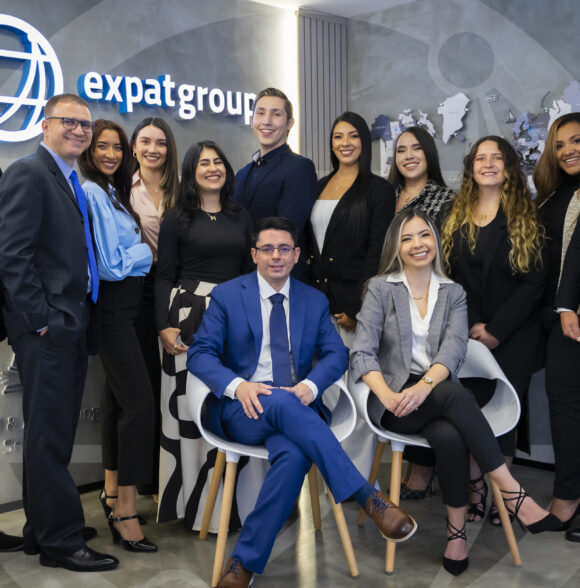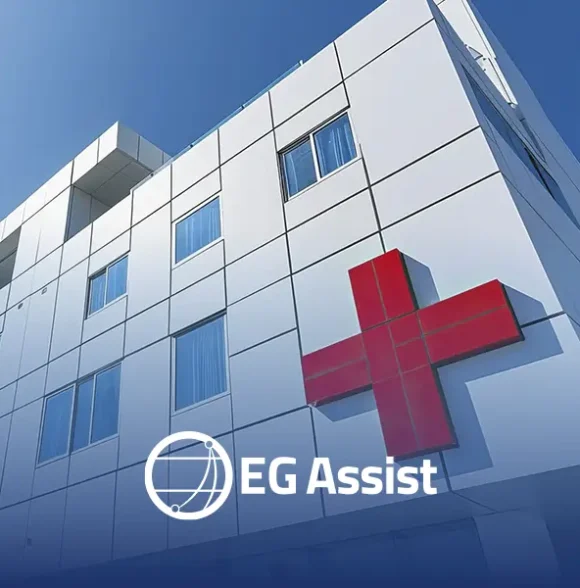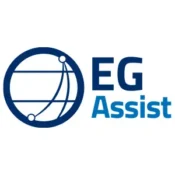Moving to Bogotá is an exciting step, but understanding the city’s immigration landscape is crucial for a successful expat experience. This guide explores the full range of immigration services available in Bogotá, from key government agencies like Migración Colombia and the Ministry of Foreign Affairs to reputable private organizations and support networks. Whether you’re applying for a visa, registering your residency, or seeking help with documentation, you’ll find practical tips to make your journey easier and more informed.
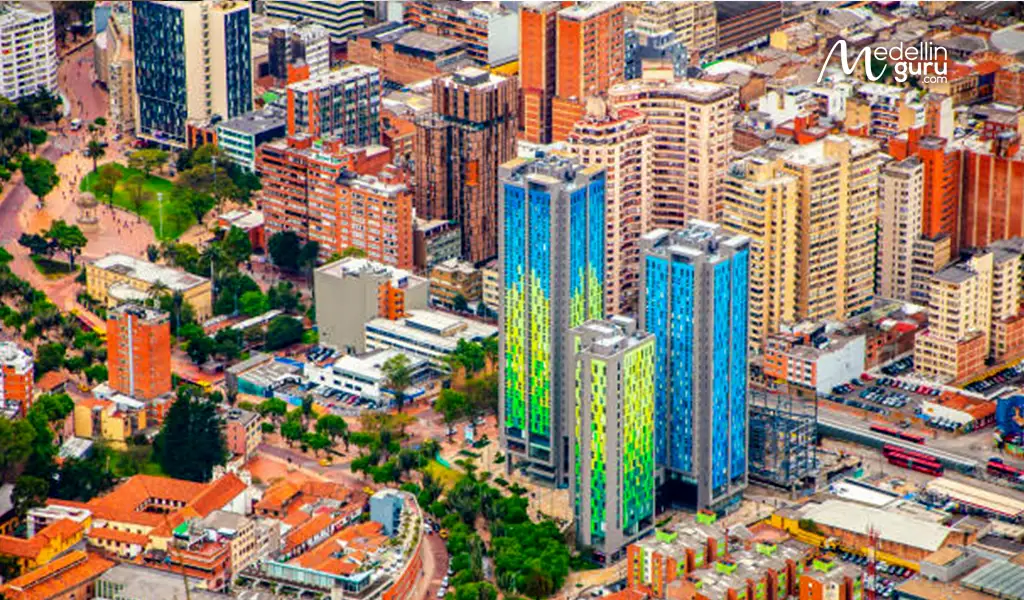
Navigating migratory services in Bogotá involves understanding a variety of legal and administrative procedures designed to help foreigners establish and maintain their legal status in Colombia. These services cover everything from obtaining the right visa and registering with Migración Colombia to securing essential identification documents and complying with reporting requirements.
Key government agencies such as Migración Colombia and the Ministry of Foreign Affairs (Cancillería) oversee these processes, while private organizations and legal experts often provide valuable support to expats. Whether you are applying for a work, retirement, student, or digital nomad visa, being well-informed about the required steps and documentation is crucial to avoid delays or complications.
What immigration services can you find in Bogotá?
Bogotá, Colombia’s vibrant capital and main entry point for many foreigners, serves as the central hub for a wide range of immigration services designed to help expats navigate the legal requirements of living in Colombia. Whether you are moving here for work, study, retirement, or family reasons, understanding which institutions manage each part of the immigration process can save you time and reduce stress.
Understanding the division of responsibilities between these institutions helps you navigate Bogotá’s immigration landscape more efficiently. Whether registering your visa, applying for permanent residency, or legalizing documents, knowing where to go and what to expect will make your transition smoother and more confident.
What Is the Role of the Ministry of Foreign Affairs (Cancillería) in the Colombian Visa Process?
The Ministry of Foreign Affairs of Colombia, commonly known as Cancillería, is the government body responsible for directing and coordinating Colombia’s foreign policy and managing its international relations. Its primary functions include establishing and maintaining diplomatic relations with other countries and international organizations, negotiating and signing international treaties and agreements, and representing Colombia in multilateral forums such as the United Nations and the Organization of American States.
Cancillería also provides consular services to Colombian citizens abroad, including issuing passports and offering assistance in emergencies. It oversees the legalization and apostille of documents to facilitate their international use and manages matters related to Colombian nationality, such as naturalization and renunciation.
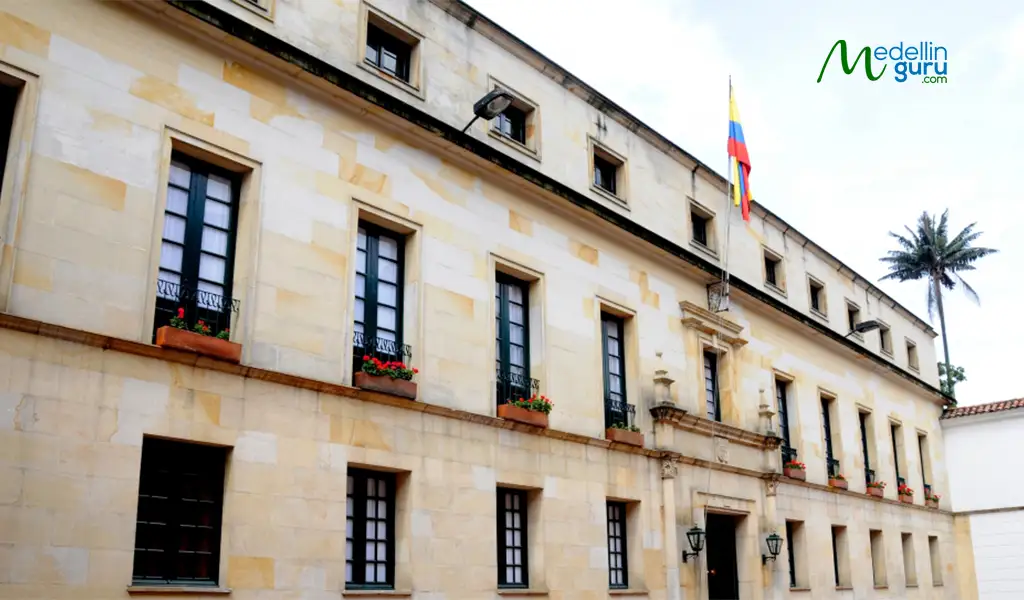
Visa Applications
Visa applications for Colombia are primarily managed through the Ministry of Foreign Affairs’ (Cancillería) online portal. This platform allows applicants to apply for a variety of visa types, including Digital Nomad, Retirement, Work, Student, and Partner visas.
The process involves carefully completing an electronic application form, uploading required documents such as a valid passport and a recent 3×4 cm photo with a white background, and submitting supporting paperwork relevant to the visa category. Applicants must also pay a visa study fee, typically around 65 USD.
Apostille and Legalization
The Ministry of Foreign Affairs (Cancillería) in Bogotá is the designated authority responsible for issuing apostilles and handling legalization processes within Colombia. For documents issued in Colombia that need to be valid abroad, Cancillería provides apostille and legalization services as well. However, certain documents issued by Colombian consuls, such as powers of attorney or civil registrations, do not require legalization.
Passport Services (for Colombians)
While passport services are not applicable to expats, it’s worth noting that the Ministry of Foreign Affairs (Cancillería) is the sole government authority responsible for issuing and managing passports for Colombian citizens. They handle various types of passports, including Ordinary, Executive, Emergency, Border, and Exempt passports. Colombian nationals can apply for or renew their passports either at the Ministry’s offices in Bogotá or through Colombian consulates abroad.
How to Get to the Ministry of Foreign Affairs (Cancillería) in Bogotá
The Ministry of Foreign Affairs (Cancillería) in Bogotá is located primarily at two main offices: the Sede Norte at Avenida 19 No. 98-03, Edificio Torre 100 (Floors 1 and 6), and the Sede Centro at Calle 12C No. 8-27, Piso 1. The Palacio de San Carlos at Carrera 5 No. 9-03 also serves as the central headquarters for diplomatic activities and correspondence.
It is important to note that all chancery services are now handled virtually, and in-person visits to these offices are generally not required or recommended. The Ministry of Foreign Affairs strongly encourages users to access services such as visa applications, apostilles, legalizations, and passport requests through their online platforms to avoid unnecessary trips and wait times.
While the Ministry of Foreign Affairs has streamlined many processes online, navigating the specifics of Colombian visa applications can still be intricate. If you prefer expert guidance to ensure a smooth and error-free process, consider partnering with professionals. Let expatgroup.co simplify your visa journey in Bogotá. Discover how our dedicated team can assist with your application, document preparation, and follow-up, offering peace of mind every step of the way.
What Are the Main Functions of Migración Colombia?
Migración Colombia is the Colombian government agency responsible for managing and controlling migration within the country’s borders. Established in 2011 under the Ministry of Foreign Affairs, it oversees the legal entry, stay, and exit of foreigners, ensuring compliance with national immigration laws and protecting Colombia’s sovereignty.
Its primary functions include controlling migration flows at all points of entry, registering foreigners with visas valid for longer than 90 days, and issuing key immigration documents such as the Cédula de Extranjería (foreigner ID card). Migración Colombia also manages temporary permits like salvoconductos, monitors changes in migratory status, and enforces immigration regulations to prevent irregular stays.
Beyond border control, Migración Colombia facilitates the integration of migrants by maintaining accurate registries, coordinating with other government agencies, and collecting migration data to inform public policy. For expats, it is the agency responsible for visa registration, residency documentation, and ongoing immigration status management.
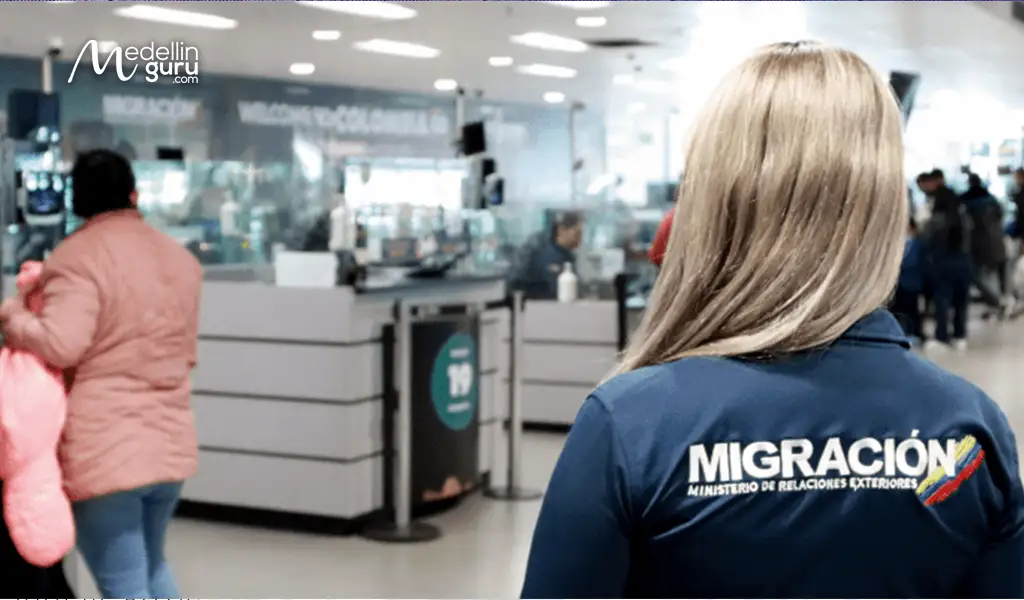
Visa Registration
Once your visa is approved by the Ministry of Foreign Affairs (Cancillería), you must register it with Migración Colombia within 15 days of the visa’s issuance or your entry into Colombia with the new visa. This registration is a mandatory step that activates your legal stay in the country. Failure to complete this process within the specified timeframe can lead to complications with your immigration status.
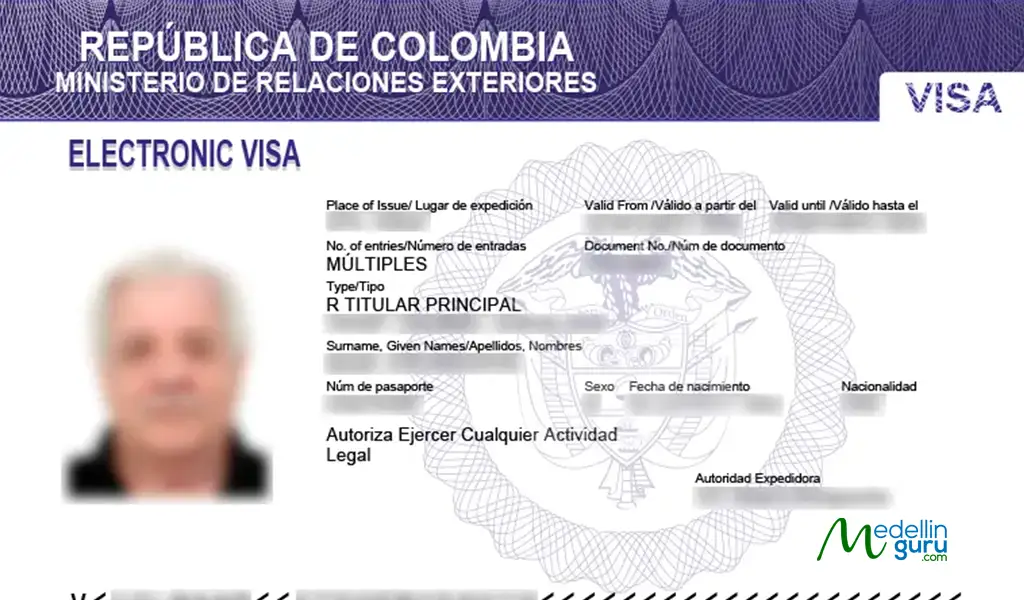
Cédula de Extranjería Issuance
After registering your visa, you become eligible to apply for the Cédula de Extranjería, the official foreigner ID card required for many daily activities in Colombia, such as opening bank accounts or signing rental agreements. It’s important to note that visas valid for less than 90 days, such as tourist visas, generally do not require registration.
The Cédula de Extranjería is the official identification card issued to foreigners residing in Colombia with a valid visa longer than three months. It serves as a critical document for accessing essential services such as opening bank accounts, signing leases, and obtaining phone plans, effectively enabling expats to function fully within Colombian society.
To obtain the Cédula, you first need to have your visa approved and registered with Migración Colombia. It’s important to note that the Cédula de Extranjería process can only be completed inside Colombia, and you have 15 calendar days from your visa issuance or entry into the country to apply. While you can apply at any Migración Colombia office nationwide, the physical card must be collected from the office where you completed the procedure.
As of 2025, the fee for obtaining the Cédula de Extranjería is 280,000 Colombian pesos, which is approximately 280,000 Colombian pesos, which is approximately $69 USD, calculated using the reference exchange rate of 1 USD = 4,071.46 COP, though exchange rates may fluctuate. Processing times for the physical card can vary, and some expats have reported delays that extend to several weeks or even months.
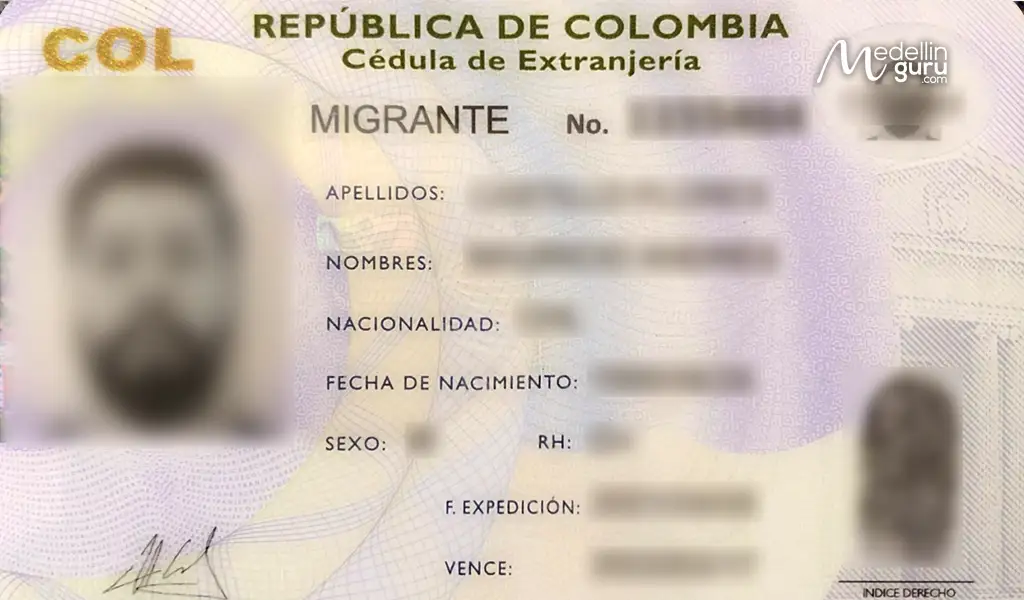
Salvoconductos
A salvoconducto is a temporary permit issued by Migración Colombia that allows foreigners to legally stay in Colombia under specific circumstances, such as when they are in the process of changing or applying for a visa, awaiting their Cédula de Extranjería, or facing exceptional situations requiring temporary legal status. Typically valid for 30 days and extendable for an additional 30 days in special cases, the Salvoconducto serves as a crucial document to avoid penalties or deportation while immigration matters are being resolved.
To obtain a salvoconducto, you must complete an online application through Migración Colombia’s system, attach required documents such as your passport and proof of visa application, and schedule an appointment at the nearest Migración Colombia office.
As of 2025, new tariffs for various migratory services, including salvoconductos, became effective on March 3, 2025, as per Resolution No. 0633 of 2025. The cost for a Salvoconducto is 84,000 Colombian pesos, which is approximately 20.50 US dollars.
Certificado de Movimientos Migratorios
The Certificado de Movimientos Migratorios is an official document issued by Migración Colombia that provides a detailed record of a person’s entries and exits from Colombia over the past five years. This certificate includes information such as the dates of entry and exit, immigration control , travel conditions, and personal identification details. It is often required for various legal and immigration processes, including visa applications, changes in migratory status, and naturalization procedures.
Reporting Changes
Once you are a registered foreigner in Colombia, Migración Colombia requires you to report any changes in your personal information, such as your address or marital status. Keeping this information up to date is essential for maintaining your legal residency and ensuring that all official correspondence reaches you promptly. Timely reporting of these changes helps avoid complications with your immigration status and ensures compliance with Colombian regulations.
How to Get to Migración Colombia in Bogotá
The main Migración Colombia office in Bogotá for foreigner services is located at Calle 100 No. 11B-27, in the Chapinero district. This office handles essential immigration procedures such as visa registration, Cédula de Extranjería issuance, and temporary permits.
For expats arriving in Bogotá, there are several convenient ways to reach this office from key points in the city:
From El Dorado International Airport: The office is approximately a 25-minute drive (about 15 km) northeast of the airport. Taking a taxi or ride-hailing service directly from the airport is the easiest option. Alternatively, you can use TransMilenio public transit by taking the B Line from the airport to Calle 100 station, then walking or taking a short taxi ride to the office.
From Downtown Bogotá: The Migración Colombia office is about 7 km north of downtown. You can reach it by taxi or ride-hailing service in roughly 20 minutes, depending on traffic. Public transit options include taking the TransMilenio from the city center towards the north and transferring to a local bus or walking to the office near Calle 100.
From Terminal Salitre (the main bus terminal): The office is roughly 10 km northeast of Terminal Salitre. A taxi or ride-hailing service will take about 20–30 minutes. Public transit options involve taking a bus or TransMilenio towards the north and transferring near Calle 100.
What Services Does the U.S Embassy in Bogotá: Services and Support for American Expats
The U.S. Embassy in Bogotá serves as the primary point of contact and support for American citizens living in or visiting Colombia. Its mission is to advance U.S. interests and provide assistance and protection to U.S. citizens throughout the country
Consular Services for U.S. Citizens
The Embassy offers a comprehensive range of consular services for American expats, including passport renewal and replacement, notarial services, and assistance with Social Security and other federal benefits. In case of emergencies—such as arrests, medical incidents, or the death of a U.S. citizen—the Embassy provides direct support and guidance, working closely with local authorities and families to resolve urgent situations.
For those needing to renew or replace their U.S. passport, the Embassy facilitates the process through scheduled appointments and provides clear instructions for document submission and collection.
Support for Federal Benefits and Emergency Assistance
American residents and retirees in Colombia can access help with Social Security, federal benefits, and related inquiries through the Embassy. Periodically, the Regional Federal Benefits Unit visits Bogotá and other major cities to assist with these services in person.
In emergencies, U.S. citizens can contact the Embassy for immediate assistance. The Embassy maintains a 24/7 emergency line and can coordinate with local hospitals, police, and legal representatives as needed.
Visa Services for Non-U.S. Citizens
The U.S. Embassy in Bogotá also processes non-immigrant and immigrant visa applications for Colombian nationals and other foreign citizens wishing to travel to the United States. This includes tourist, student, work, and family-based visas.
Location, Contact Information, and Appointments
The U.S. Embassy is located at Calle 24 Bis No. 48-50, Bogotá, D.C. It is accessible from key areas of the city, including El Dorado International Airport, downtown Bogotá, and the main bus terminals. For most services, appointments must be scheduled in advance through the Embassy’s online system.
Contact Information:
- Website: co.usembassy.gov
- Main Phone: +57 (601) 275-2000
- Emergency After Hours: +57 (1) 275-2000
What Essential Immigration Processes Do Expats Need to Navigate in Bogotá?
Securing your visa is just the first step in establishing your legal status in Colombia; understanding and managing the necessary immigration documents is equally important. After your visa approval and registration with Migración Colombia, obtaining your Cédula de Extranjería is a fundamental milestone, but there are several other key documents and processes that expats should be aware of to ensure smooth integration and legal compliance.
Police or Background Checks
The FBI Background Check is an official criminal record issued by the United States for American expats. It must be apostilled by the U.S. Department of State to be valid for Colombian immigration purposes. This document is necessary because Colombian authorities require a clear criminal history to process many visa types and residency applications. Since the FBI Background Check and apostille process can take several weeks—often 5 to 6 weeks or longer—it is strongly advised that American expats obtain these documents well in advance of their visa application. Failure to provide a properly apostilled background check can delay or even jeopardize visa approval.
Travel Health Policy
Expatgroup.co in partnership with the best health policy provider for expats in Colombia, EG Assist, also offers advice on acquiring the mandatory health policy requirement for a colombian visa application through the specialized plans that prioritize the best coverage, medical assistance and and the most competitive price among other options
EG Assist
Civil Registry Documents
Birth certificates, marriage certificates, divorce decrees, and other vital records may be necessary for family visas, residency, or citizenship applications. These documents must be apostilled or legalized and translated if not originally in Spanish.
Apostille and Translation of Foreign Documents
Many foreign documents must be apostilled or legalized and translated into Spanish to be legally recognized by Colombian authorities. Apostille is an international certification under the Hague Apostille Convention that authenticates public documents for use abroad. For countries that are not members of the Convention, a more complex legalization process involving Colombian consulates abroad is required.
Common documents that require apostille and official translation include:
- Birth certificates
- Marriage certificates
- Divorce decrees
- Educational diplomas and transcrips
- Police clearance certificates
- Financial documents suchs as bank statements or pension letters
- Power of attorney and other notarized documents
Proper apostille or legalization ensures that these documents are accepted by Colombian immigration and civil authorities.
U.S. Benefit Letter (For Pensioner Visa Applicants)
The U.S. Benefit Letter is a document issued by the Social Security Administration or other relevant federal agencies that confirms the amount of benefits an individual receives. This letter is specifically required for applicants of the Colombian Pensioner (Retirement) Visa, as it serves as proof of stable income from a U.S. pension or retirement fund. Providing this official document helps demonstrate financial self-sufficiency, an essential criterion for visa approval under this category.
Can Expatgroup Simplify Your Immigration and Visa Processes in Bogotá?
Navigating Colombia’s immigration system can be complex and time-consuming, especially with frequent regulatory updates and detailed documentation requirements. Expatgroup.co offers comprehensive support that goes far beyond just visa applications, helping expats manage every stage of their immigration journey in Bogotá and across Colombia.
Expatgroup.co’s approach combines personalized legal advice, meticulous document review, and direct liaison with Colombian government agencies like the Ministry of Foreign Affairs and Migración Colombia. Whether you’re applying for your first visa, renewing your residency, or handling complex immigration cases, their professional support streamlines the process and reduces stress.
Medellin Guru Visa Service
The visa agency we partnered with has helped 2,171 Medellin Guru readers
GET 40% OFF IN YOUR COLOMBIA VISA PROCESS
The expatgroup.co anniversary offer is now open! Start your Colombian visa application with our reliable partner and confidently relocate to Colombia.
*Offer available until January 30th and applies only to the EG’s service fee.
*Apply terms and conditions.
Expatgroup’s New Bogotá Office: Personalized Support in the Capital
To better serve expats living in or relocating to Bogotá, Expatgroup.co has recently opened a dedicated office in the city. This new location allows for in-person consultations, document drop-off, and personalized assistance while maintaining their fully remote services for those outside Bogotá or preferring online support.
The Bogotá office is conveniently located at Calle 100 No. 11B-27, Chapinero, near major transit routes and easily accessible from El Dorado International Airport, downtown Bogotá, and other popular expat destinations. Whether you need help scheduling appointments, preparing complex paperwork, or navigating local immigration offices, their Bogotá team is ready to assist you every step of the way.
From El Dorado International Airport (BOG)
By Taxi / App (Uber, DiDi, Cabify):
- Estimated time: 35–60 minutes (depending on traffic)
- Estimated fare: COP 35,000–50,000
- Route: The driver will usually take Avenida El Dorado (26) heading east, then connect to Carrera 30 (NQS) going north, and finally turn east on Calle 92 or Calle 94 to reach Carrera 11, then head south to Calle 91.
Tip: Ask the driver to drop you off at the corner of Calle 91 and Carrera 11, then walk half a block west. (quote widget)
From TransMilenio (mass transit) – Using Public Transport
Nearest TransMilenio Station: Virrey (Line B or D, Red Trunk Route)
- Take a TransMilenio bus that connects to the Station Virrey.
- Leave the station and take the integrated route 19-8 La Cabrera, which will leave you just a few blocks from the physical location for fingerprinting.
- The destination is on the left-hand side at Calle 91 #11-29.
Tip: Use Google Maps walking mode for orientation. Walking in daylight is safe in this area.
From La Candelaria (Historic Center)
By Taxi / App:
- Estimated time: 30–50 minutes
- Estimated fare: COP 30,000–45,000
Route: Most drivers take Carrera 7 northbound or Avenida Circunvalar, eventually connecting with Calle 92 or Calle 94, then turning onto Carrera 11.
From Zona T / Parque de la 93 Area
On Foot:
- From Parque de la 93, walk south one block to Calle 92, then continue west until Carrera 11.
- Turn left (south) and walk one block to Calle 91.
- The building is on the right side.
Estimated walk time: 7–10 minutes.
Tip: This is a safe and walkable area for foreigners.
Medellin Guru's comprehensive visa and passport series
The Colombian visa changes that went into effect in October 2022 were significant. So, on the Medellin Guru site, we have a comprehensive series of visa articles that are kept up-to-date and should answer most visa questions. These articles include:
- Colombia Visa Guide: Ultimate Guide How to Get a Colombian Visa
- How to Obtain a Colombian Visa with Up-to-Date Info – an overview of all the Colombian visas
- Popular Colombian Visas for Foreigners: Which Visa is the Most Popular?
- Coronavirus Impacts on Colombian Visas and Tourist Visas
- Visa Agencies: A Guide to Visa Agencies in Medellín and Colombia
- 9Common Colombian Visa Mistakes: How to Avoid Them
We have looked in detail at the nine most popular Colombian visas used by foreigners:
- Digital Nomad Visa
- Retirement visa
- Marriage visa
- Investment visa
- Business Visa
- Resident visa
- Work visa
- Student visa
- Visitor visa
Also, we have looked in detail at three additional Colombian visas, which are less popular for foreigners:
- Rentista visa (annuity visa) – for foreigners with a fixed income
- Beneficiary visa – for relatives of visa holders
- Expertise visa – for professionals
In addition, we have a guide to Colombia tourist visas and how to extend a tourist visa. Also, we have a guide to renewing U.S. passports in Colombia and a guide to obtaining a Colombian passport.
Furthermore, we provide information about travel health policy that meets the health requirement for Colombian visas. And we have a guide to how apply for a cedula extranjeria in Colombia and a guide to using notaries in Medellín and Colombia. Finally, Medellin Guru has partnered with a visa agency to offer Colombia visa services.
All of our Colombia visa articles are up to date (2024) and constantly receive updates in 2025.
The Bottom Line: Migratory Services in Bogotá for Expats in Colombia
Successfully navigating migratory services in Bogotá is a crucial step for any expat aiming to build a new life in Colombia’s capital. From understanding the distinct roles of Migración Colombia and the Ministry of Foreign Affairs to managing essential documents like your visa, Cédula de Extranjería, and background checks, each stage of the process requires careful attention to detail and up-to-date information. With evolving regulations and the need for accurate paperwork, having access to clear guidance and reliable support can make all the difference.
With the right resources, your transition to Bogotá can be smooth, secure, and successful.
Medellin Guru Social media
Be part of our community. Find out about news, participate in events and enjoy the best of the city.


